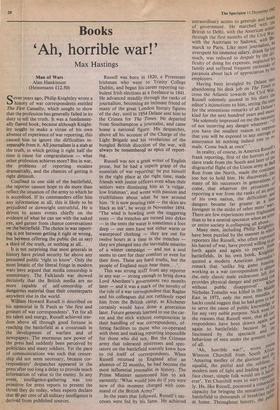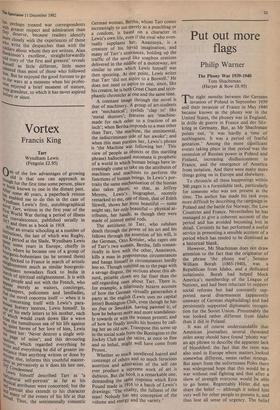Books
`Ah, horrible war!'
Max Hastings
Man of Wars Alan Hankinson (Heinemann 12.50)
SSeven years ago, Philip Knightley wrote a history of war correspondents entitled The First Casualty, which sought to show that the profession has generally failed in its duty to tell the truth. It was a fundament- ally flawed book, because although Knight- ley sought to make a virtue of his own absence of experience of war reporting, this caused him to ignore the difficulties in- separable from it. All journalism is a stab at the truth, in which getting it right half the time is cause for congratulation — what other profession achieves more? But in war, the problems of reporting escalate dramatically, and the chances of getting it right diminish.
Confined to one side of the battlefield, the reporter cannot hope to do more than reflect the situation of the army to which he is accredited. If its commanders offer him any information at all, this is likely to be prejudiced or downright untruthful. He is driven to assess events chiefly on the evidence of what he can see with the naked eye, and garner from chance conversations on the battlefield. The choice in war report- ing is not between getting it right or wrong, but between offering the public (let us say) a third of the truth, or nothing at all..
It is not surprising that most generals in history have prized security far above any presumed public 'right to know'. Only the most lunatic of the liberal fringe in modern wars have argued that media censorship is unnecessary. The Falklands war showed decisively that the British media are no more capable of self-censorship of dangerous material than their counterparts anywhere else in the world.
William Howard Russell is described on his memorial in St Pauls as 'the first and greatest of war correspondents'. Yet for all his talent and energy, Russell achieved star- dom above all through good fortune in reaching the battlefield at a crossroads in the development of warfare and of newspapers. The enormous new power of the press had suddenly been perceived by politicians and many soldiers. Yet the pace of communications was such that censor- ship did not seem necessary, because cor- respondents' despatches appeared in the press after too long a delay to provide much information of value to the enemy. In any event, intelligence-gathering was too primitive for press reports to present the threat they do today, when experts declare that 60 per cent of all military intelligence is derived from published sources. Russell was born in 1820, a Protestant Irishman who went to Trinity College Dublin, and began his career reporting tur- bulent Irish elections as a freelance in 1841. He advanced steadily through the ranks of journalism, becoming an intimate friend of many of the great London literary figures of the day, until in 1854 Delane sent him to the Crimea for The Times. He departed from Southampton a journalist, and came home a national figure. His despatches, above all his account of the Charge of the Light Brigade and his revelations of the bungled British direction of the war, will always be remembered as epics of report- ing.
Russell was not a great writer of English prose, but he had a superb grasp of the essentials of war reporting: he put himself in the right place at the right time, made friends with junior officers even when their seniors were dismissing him as 'a vulgar, low Irishman', and wrote with passion and truthfulness about what he saw around him. 'It is now pouring rain — the skies are black as ink', he wrote in November 1854. 'The wind is howling over the staggering tents — the trenches are turned into dykes — in the tents the water is sometimes a foot deep — our men have not either warm or waterproof clothing — they are out for twelve hours at a time in the trenches — they are plunged into the inevitable miseries of a winter campaign — and not a soul seems to care for their comfort or even for their lives. These are hard truths, but the people of England must hear them... '.
This was strong stuff from any reporter in any war — strong enough to bring down Lord Aberdeen's government two months later — and it was a mark of the novelty of the role of a war correspondent that Raglan and his colleagues did not ruthlessly expel him from the British camp, as Kitchener certainly would have done a generation later. Future generals learned to use the car- rot and the stick without compunction in their handling of war correspondents, of- fering facilities to those who co-operated with them and making reporting impossible for those who did not. But the Crimean army that tolerated mistresses and spec- tators on the battlefield scarcely knew how to rid itself of correspondents. When Russell returned to England after an absence of 22 months, he had become the most influential journalist in history. The Prime Minister summoned him to ask earnestly: 'What would you do if you were now of this moment charged with com- mand of the British Army?'
In the years that followed, Russell's suc- cesses were fed by his fame. He achieved
extraordinary. aTl iccee Ss sp etcot a generals oern le lr aDI se cae mn db e a9c8125 of government. He marched with the British to Delhi, with the American annieS through the first months of the Civil War' with the Austrians to Sadowa, with Bis. marck to Paris. Like most journalists, he overspent his immense salary, drank far too much, was reduced to despair by the di!. ficulty of doing his expenses, neglected his, family and suffered frequent outbreaks 01 paranoia about lack of appreciation bY employers. h/5 Having been inveigled by Delane int° abandoning his desk job on The Tinies to cross the Atlantic towards the Civil War' Russell solemnly quoted in his diary the editor's injunctions to him, setting the tone for the sententious remarks of all Deane's kind for the next hundred years and more' 'He solemnly impressed on me the necessA of not incurring any danger whatever: you have the smallest reason to suPP°se that you will be exposed to any outrage °r main. Come elebtacnkotahtinogncien,d,u,ce you in to In reality, of course, in America Russell's frank reporting, first of the horrors of the slave trade from the South and later of II disgraceful flight of the Union army at 511 t Run from the North, made the continen too hot to hold him. He discovered, many of his successors in generations ty,. come, that whatever the privations 0' reporting a war from the ranks of an ail of his own nation, the difficulties Ole dangers became far greater as a 115. foreigner in the midst of other mens' Wa:ng There are few experiences more frighte01"y than to be a neutral spectator when an aril' or entire society is collapsing all about-, ,
Many men, including Philip Knightie.7
: have been puzzled by the manner in whiend reporters like Russell, who often exPresseo his hatred of war, have proved willing ta gni forth again and again to report ft.? v battlefields. In his own book, Knig_,11;t:ie:s quoted a modern American journa'''c remark that 'unlike big game bur:tit:1°5i working as a war correspondent is anni,o1 the. only classic male endeavour left t"isi4 provides physical danger and personalrvo without public disapproval'. Z.ddie Nicholas Tomalin was killed in the East in 1973, only the most maudhnwor hacks could suggest that he had gone t° or to serve the cause of public knowleelgefor for any very noble purpose. Nick werlt,or. the reasons that Russell went, that ali 'ad respondents have been drawn again 30,35 again to battlefields: because he, the fascinated by the spectacle and ss of all.of men under the greatest stre ,ning `Ah, horrible war!', wrote Winston Churchill from SouthiuArithe 'Amazing medley of the glorious a°' if squalid, the pitiful and the subliale'oar modern men of light and leading sat,Yrcil) face closer, simple folk would see it °aid- ever'. Yet Churchill went to wars rePenabie ly. He, like Russell, possessed a rernarkr tbe capacity for bringing the sensations 0'00 battlefield to thousands of breakfast tablic at home. Throughout history, the Pn has Perhaps treated war correspondents ‘thevth greater respect and admiration than Y deserve, because readers identify nlore closely with the experiences of those ‘vho write the despatches than with the !?Idiers about whom they are written. Alan rlankinson's excellent, straightforwardly told story of 'the first and greatest' reveals Russell as little different, little more thala ented than most of those who followed t ll. But he enjoyed the good fortune to go the wars at a moment when his profes- e.„°11 enjoyed a brief moment of stature, L'en grandeur, to which it has never aspired Wore or since.











































 Previous page
Previous page